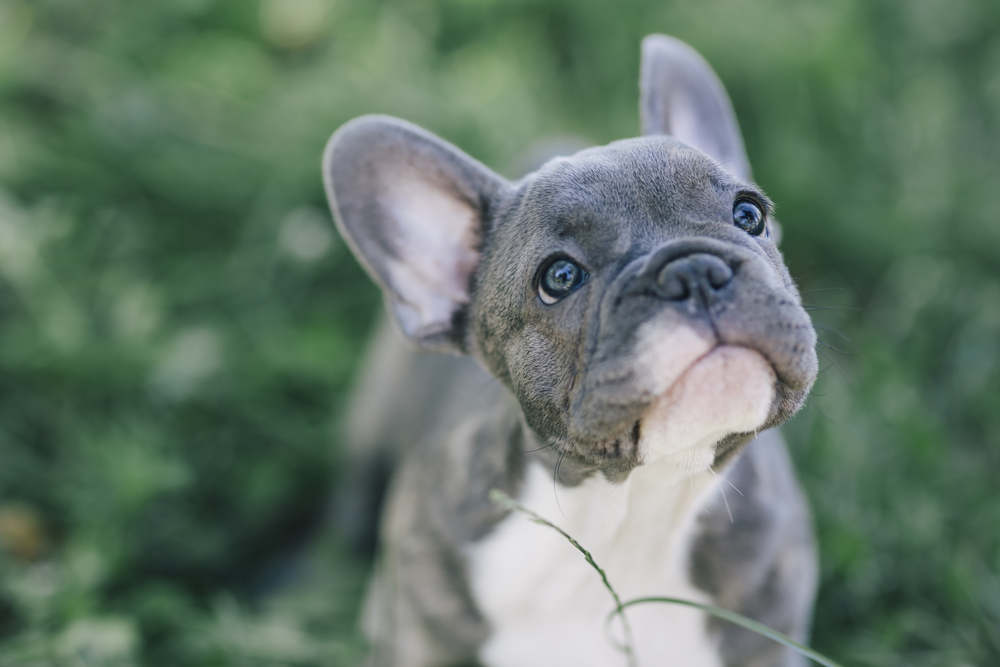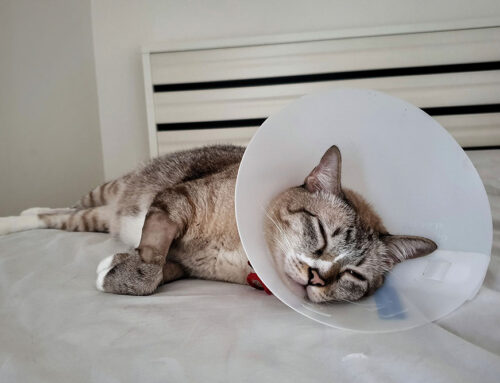Ooh la la! French bulldogs have us wrapped around their little paws. They are the most popular pooches in the United States, according to the American Kennel Club (AKC), which calls the breed an “adorable little bowling ball of a dog” that was “produced in England, popularized in France, and perfected in America.”
Frenchies trace their roots to mid-19th century England’s bull-baiting dogs. French breeders developed a distinct bulldog that was smaller than the breed’s athletic, long-legged English ancestors. Later, American fanciers made Frenchies’ distinctive bat ears part of the breed standard.
Unfortunately, when the French bulldog first claimed the canine world’s top spot in 2022, many veterinarians became concerned because these dogs, delightful as they may be, are susceptible to various health problems. If you have a Frenchie, keep an eye out for the health issues our Oliver Animal Hospital team discusses here.
Rave reviews and veterinarians’ cautions
Frenchie lovers rave about these dogs’ intelligence, playfulness, and affectionate nature. They say these dogs make ideal companions because they’re well-behaved—except for a stubborn streak—and require little grooming and minimal exercise. The breed is loyal and easy to train, they enjoy being the center of attention, and they make good watchdogs although they don’t bark much.
10 health issues that often affect French bulldogs
#1. Breathing problems — With their short noses, narrowed nostrils, and long soft palate, among other anatomical issues, Frenchies are prone to brachycephalic obstructive airway syndrome (BOAS). This can cause dogs to gasp for air, vomit, and be unable to exercise. Surgery can help, but no BOAS cure exists.
#2. Intervertebral disc disease (IVDD) — A slipped spinal disc can bring on sudden paralysis that requires surgery. Keep in mind that the procedure may be successful for a while but the issue may occur again.
#3. Brain tumors — Many Frenchies get brain tumors when they’re young because their short noses make them prone to pituitary gland and glial cell tumors.
#4. Heart base tumors — Chronic breathing problems can lead a French bulldog to develop tumors near the heart. These tumors are common in older, short-nosed dogs. Removing the pericardium and providing radiation therapy are the two treatment options.
#5. Colitis — Young Frenchies are predisposed to colitis—severe, chronic diarrhea—associated with invasive E. coli bacteria. Fortunately, treatment with fluoroquinolone antimicrobials can bring lasting relief.
#6. Elbow fracture — French bulldogs are eight times more likely than crossbred dogs to break their elbows.
#7. Heart defect — Pulmonic stenosis, an inherited, congenital heart defect, is common in French bulldogs and can be serious. Veterinary surgeons treat this condition with balloon valvuloplasty, using a catheter with a balloon on the tip to open the heart valve, and stenting.
#8. Skin issues and allergies — Frenchies’ unique physical characteristics can lead to skin issues, such as skinfold, contact dermatitis, pyoderma—a bacterial skin infection—and canine acne. Food or environmental allergies can result in skin or digestive issues.
#9. Eye issues — French bulldogs’ forward eye position makes them susceptible to injuries and corneal defects.
#10. Obesity — Since Frenchies don’t crave much exercise, they can easily become obese. The breed standard limits acceptable weight to 28 pounds. Obesity signs include lacking defined muscles, struggling to scratch the ears, and breathing heavily even when at rest.
Keeping your French bulldog healthy and happy

French bulldogs typically live 10 to 14 years. The oldest one on record lived 18 years, 3 months, and 8 days. Rocco, a 17-year-old Frenchie, may be the next record breaker, which his owner has attributed to love, a healthy diet, and lots of attention.
Nutrition is especially important in this breed that’s prone to obesity. French bulldogs thrive on a balanced diet that is appropriate for their life stage and approved by the Association of American Feed Control Officials (AAFCO). Feed your French bulldog puppy three or four meals per day during their first year. Dogs from 1 to 7 years of age need two adult food meals per day. Dogs older than 7 years of age do best on a senior diet. You can try feeding your Frenchie a reduced-calorie diet if they start looking pudgy.
French bulldogs can eat dry food, wet food, or a combination. For guidelines on the appropriate amount to feed your Frenchie, check the food bag or can. In addition, including an omega-3 supplement in your dog’s food is a good way to support your French bulldog’s healthy skin, coat, and joints.
To train your Frenchie, use positive reinforcement. This works well since Frenchies love attention. Despite their reputation for stubbornness, they enjoy obedience training. French bulldogs believe life is for having fun, so make games and playtime a big part of your dog’s training and everyday routine. Train your Frenchie to accompany you on a leash, so you can take short daily walks together.
Because Frenchies have short coats, they don’t need much grooming. However, these areas need attention:
- Skincare — Keep skinfolds clean and dry, and bathe your dog every month or two to help them avoid allergies.
- Coat care — A weekly brushing is all a Frenchie needs to eliminate loose hairs.
- Eye care — Wipe your dog’s eyes to clear away drainage.
- Ear care — To prevent ear infections, clean your dog’s ears every week or two with a canine ear cleanser. Check your Frenchie’s ears after bathing or other contact with water to ensure their ear canals remain clean and dry.
A French bulldog can brighten your life with love and fun. If you have questions about keeping your Frenchie in the best health, contact our Oliver Animal Hospital team.







Leave A Comment